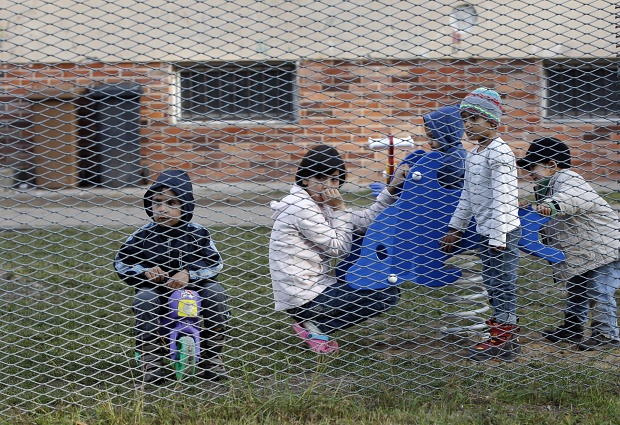Refugees still feel like ‘prisoners’ as Czech camp touts improvements

Migrant children play at the Bela-Jezova refugee facility in Bela pod Bezdezem, Czech Republic, Thursday, Nov. 5, 2015. The Bela-Jezova center can accommodate up to 700 refugees and it has been at a center of a recent controversy after conditions in it were condemned as particularly unsuitable for children by the head of the U.N. refugee agency, the Czech Republic’s ombudsman and local groups that help the asylum seekers. The Interior Ministery allowed Thursday the media and representatives of western embassies to visit it for the first time following the wave of criticism. AP Photo
BĚLÁ POD BEZDĚZEM, Czech Republic—Refugees at a Czech detention center that the UN termed “degrading” last month due to poor living conditions said Thursday they still felt like “prisoners,” despite improvements at the facility.
The Bela-Jezova facility northeast of the capital Prague opened its doors to diplomats and journalists on Thursday to showcase recent upgrades.
But Muhammad Shah Nazari, a 23-year-old university student from Afghanistan who has spent 67 days there, likened it to a prison despite admitting that conditions had gotten better over the past week.
He claims he witnessed police violence when 10 police officers beat up an African refugee who did not stand up as they entered his room.
“Police say you’re illegal, you’re prisoners, you don’t have the right to say anything,” he told reporters.
Article continues after this advertisementBritish ambassador to Prague Jan Thompson told AFP that “conditions look reasonably good” after she toured Bela-Jezova Thursday.
Article continues after this advertisement“So far I haven’t seen degrading conditions today,” she added, without offering further comment.
Martin Rozumek, a lawyer chairing the Prague-based Organization for Aid to Refugees, told AFP that past criticism aimed at the center “helped improve the situation a lot.”
He added that better conditions were largely due to a drop in the number of refugees at the facility, from 700 this summer to 58—including 26 children—on Thursday.
Some refugees were moved to other detention facilities in the Czech Republic, while others were extradited or released.
The center has recently installed new swings and sandboxes outside, and it organizes trips and theatre visits for refugee children.
But Rozumek said a new playground and improvements “absolutely do not justify keeping children behind bars and barbed wire.”
“No matter how many toys you have there, it will be a problem—with the barbed wire and the police guards and the fence, this isn’t for children.”
Czech authorities maintain that migrants who enter the European Union and NATO country without making an asylum request in their first EU port of call should be returned to the state from which they arrived, in keeping with regulations.
“Detention centers prevent refugees from running away before we return them,” said Katerina Rendlova, spokeswoman for a Czech police unit dealing with foreigners.
She added most refugees were not interested in receiving asylum in the Czech Republic, preferring instead to head to Germany and other western European countries.
Nazari said he had spent $7,000 (6,440 euros) on his trip to Europe thanks to a loan from relatives, and another 400 euros on a truck that took him from Hungary to within five minutes of the Czech-German border, where he was detained by the police.
He added his future was uncertain as “I don’t know what the Czech Republic will do with me.”
RELATED STORIES
Czech president tells migrants: ‘No one invited you’